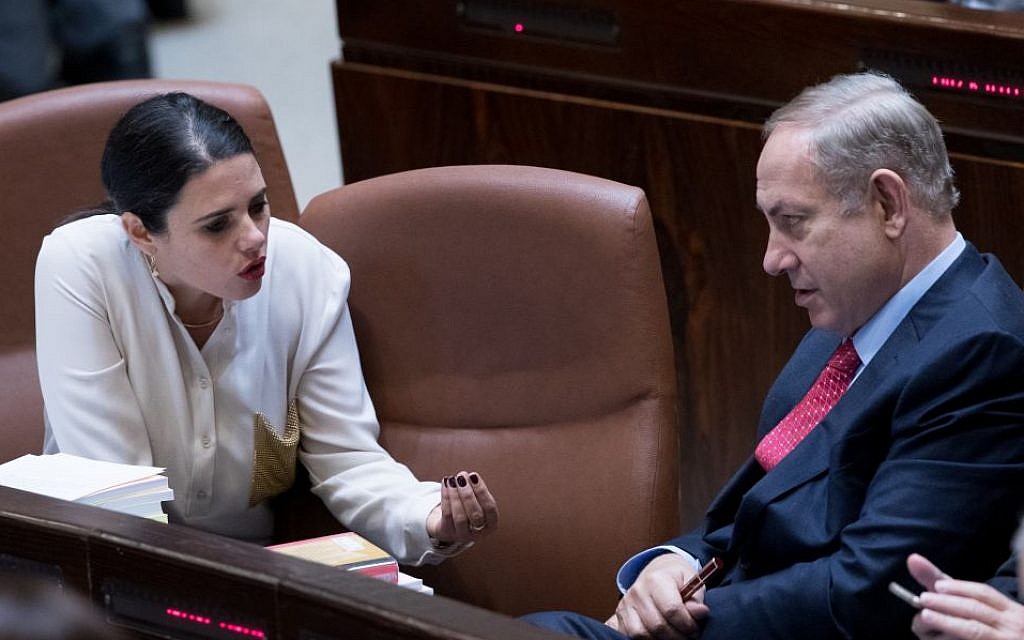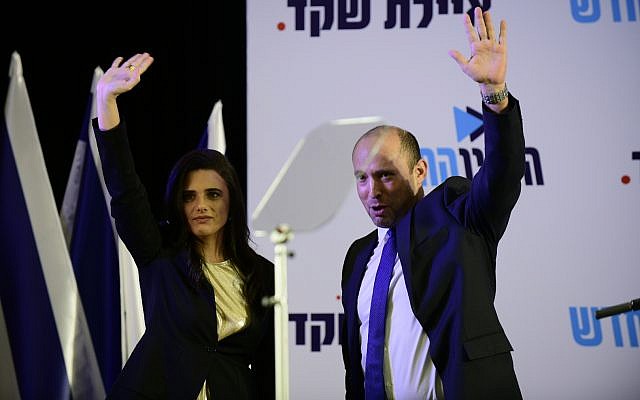PM fears that United Right, led by Ayelet Shaked, a popular ex-minister, could siphon votes away from Likud, and is concerned that other votes for fringe hardliners could be lost
By RAOUL WOOTLIFF, TOI 
Both sides are therefore relying on some form of voter swing to give their potential center-left/right-wing coalitions enough seats to form a coalition without each other and Yisrael Beytenu, come September.
That explains the motivation behind Netanyahu’s frantic efforts to prevent right-wing votes being “wasted” — that is, from going to smaller parties that fail to cross the electoral threshold, and thus reduce his chances of gaining the support of at least 61 of the 120 eventual Knesset members.
To avoid such wastage, Netanyahu has been encouraging smaller right-wing parties to merge with each other ahead of the Thursday deadline for parties to register for September’s elections. But the Monday announcement that a pair of religious, right-wing parties — New Right and Union of Right-Wing Parties — had successfully closed a deal to merge into a single electoral slate, led by popular former justice minister Ayelet Shaked, was condemned by Netanyahu’s Likud as a “dangerous mistake” that risks the prime minister’s continued rule, rather than safeguarding it.
Though desperate to see the various right-wing parties folded into his political calculations, this is not the merger Netanyahu had hoped for.
Instead of gathering the fringes of Israel’s right-wing, the new union has, so far, just brought together the mainstream factions on the right, all but guaranteeing their own political survival, but not necessarily Netanyahu’s. At the same time, it has specifically boosted two of his own rivals on the right, whom he had hoped to eliminate in April.

“If this is the end of the merging process on the right, while all the Arab parties have united, the right-wing bloc will be at risk. Bennett, Shaked, and Smotrich intentionally left out 5-6 mandates on the right — and they are knowingly jeopardizing the continuation of a right-wing government. It’s not too late to fix this dangerous mistake,” a Likud statement read, suggesting that the extremist Otzma Yehudit, Moshe Feiglin’s quasi-libertarian hard-right Zehut, and the anti-LGBT Noam party are all worth roughly four to five percent of the vote (180,000-216,000 votes), and worthy of being his political partners.
Before the April vote and again this time around, Netanyahu has actively lobbied to include the Kahanist Otzma Yehudit party in the union, believing that its hard-line voters can boost the entire right-wing bloc. He succeeded last time around, but for now, the faction remains out of the merger deal confirmed on Monday.
The joint slate, to be named the United Right, will see only Shaked and former education minister Naftali Bennett run alongside the Jewish Home and National Union factions that form URWP. The two former ministers bolted the Jewish Home last December to form the New Right, which championed “secular-religious partnership,” but failed to cross the electoral threshold in the April elections, while URWP won five seats.
A thorn in Netanyahu’s (right) side
Announcing in December that they would be leaving the Jewish Home party to form the New Right, Bennett (who led the party at the time, but gave up the top spot ahead of the new elections) and Shaked lamented that they had lost their influence over Netanyahu, and claimed they needed a new political platform to have a real impact.
Since first taking control of Jewish Home in 2012, Bennett has always pitched himself as the right-wing force keeping a flaky Netanyahu from drifting leftward. “We need a strong Jewish Home to keep the government on the right path,” he had argued during both the 2013 and 2015 election campaigns, and again, ahead of the April election.
Unveiling the New Right party last year, the pair slammed the premier for a series of policy decisions they denounced as having “strayed from the path of the right.” In so doing, Bennett and Shaked appeared for the first time to be making a bid to replace him — or at least to run an election campaign that directly challenges him.

Bennett and Shaked both began their political careers as senior aides to Netanyahu, when he was head of the opposition in 2006, but abruptly left Likud in 2008, amid rumors of personal disagreements with the Netanyahu family. Their move to Jewish Home — engineered in part by Avichai Ronsky, a settler leader and the former chief rabbi of the IDF, who died last year — was based on the idea that the religious right needed to be reinvigorated and that this must include cooperation with Israelis who are not Orthodox.
This approach also sidelined the last vestiges of the old National Religious Party, in favor of a more energetic version even less beholden to democratic rule and willing to toy publicly with explosive ideas — like backing vast judicial reform and pushing an aggressive plan to annex settlement blocs.
They initially succeeded in reaching new audiences, boosting the party from just three seats to an impressive 12 in the 2013 elections. While they were on the path to a similar result in the 2015 elections, however, Netanyahu’s warnings about the dangers of a Zionist Union victory led voters to flock to Likud, leaving the Jewish Home with just eight seats. In April, the same tactic succeeded in pushing the New Right below the electoral threshold altogether, while Likud swelled from 30 to 35 seats.

Middle row L-R: Moshe Feiglin, Benjamin Netanyahu, Naftali Bennett.
Bottom row L-R: Ayelet Shaked, Baruch Marzel, Rafi Peretz. (Flash90)
Now, concerned that a New Right-URWP merger under a reinvigorated Shaked will take away votes from Likud, Netanyahu and his wife Sara have not just pushed for a different sort of right-wing union, but have worked aggressively against the merger.
While he wants to save right-wing votes, such as those for Otzma Yehudit, from oblivion, the union headed by Shaked could end up being a direct threat to his own support. It may boost the right-wing bloc somewhat, but it is just as likely to drain support from the Likud in favor of the new United Right, with many Likud voters likely amenable to Shaked and the type of party she is forming.
In a joint statement announcing the deal, New Right and URWP said they would recommend to the president that Netanyahu form the next coalition after the elections, (a compromise by Shaked and Bennett, who had balked at the commitment in recent weeks, but ultimately agreed to the URWP demand).
For Netanyahu, that may not be enough.



@ Bear Klein:
The Supreme Court has also issued orders from time to time restricting IDF military operations and setting rules of engagement, on “humanitarian” grounds. It has declared some kinds of military operations that are necessary to protect our soldiers and to defeat the terrorists as “war crimes.”
@ Bear Klein: True. But the decision of the Supreme Court to reverse the Election Commission’s decision and allow Balad to run was an outrageous example of political meddling by the court that was contrary to both the facts and the law. And if they are not morons, although the justices must have known this.
Balad MKs and other part leaders had frequently declared the state illegitimate, supported Hamas and Fatah, supported terrorist attacks on Israelis and pro-Israel Arabs, supported BDS, etc. One of their top leaders, a former MK, had fled abroad to avoid prosecution as a spy for Hizbollah. Groups connected to Balad had made financial donations to terroriist organizations. All of this is explicitly declared in Israeli law to be grounds for excluding a party from the Knesset, and also for illegalizing the party entirely. Yet the Supreme Court concluded that there was “insufficient evince” to ban Balad from the Knesset.
At the same time, theyupheld the Knesset ban on Michael Ben-Artzi of Otsma Yehudit because he had posted some anti-Arab tweeets on Facebook. The court ruled this constituted “incitement” and upheld the Commissions ban on Ben-Artzi.
These rulings were not only in flagrant contradiction to Israeli law and the facts of the case, but demonstrated what the political allegiances of the court were.
@ Bear Klein: I hope to God you are right, Bear! No I won’t bet on it. I can’t afford to gamble.
@ Adam Dalgliesh:
The author of the Article is Zahava Englard Shapiro
@ Adam Dalgliesh:Some of the Arabs you said were going to be in a coalition were banned from the election by the election committee until the court overturned the committee. Some of these people have worked with terrorists. They work against the Jewish State of Israel.
https://www.reuters.com/article/us-israel-election-candidates/far-rightists-cleared-for-israel-election-arab-party-blocked-idUSKCN1QO111
@ Adam Dalgliesh:I am willing to bet money that the Arabs will not be part of the coalition. Name you sum! NO WAY IN HELL!!
Elizabeth Warren or Hillary Clinton would be Trump’s running mate in 2020 before this happens. The Pope will convert to Judaism first. The USA will give Texas and California back to Mexico first. Well California is actually half way there or its way to declaring itself a separate country.
Sorry you do not get the hate between the Arab Political Parties (Ballad is part of the Joint List) and Israelis. It is way worse than the divide between the most extreme Democrat and Extreme Republican.
Name your sum I like easy money. Do you pay your bets? I do. Make it a large sum please.
@ Adam Dalgliesh:Click on the title above “Let Ayelet, and Israel, win!” That is were the link you is in red you are unable to see.
Bear, I agree 100 per cent with this article from JNS. Author? Reprinted where?
However, I now am reasonably sure that the “Left” will form the next government after the September 17 elections. My reasoning is this: the left will almost certainly have more than 61 mandates if it can persuade the Arab United List to give it a vote of confidence. In return, the left-of-center Jewish parties will give the Arabs several Knesset committee chairmanships, plus control over executive offices that disburse benefits to Arabs, control Arab schools, and allocate money for Arab housing and other construction projects in the Arab cities and villages. A “Ministry for Arab Affairs” will be created to bring together all these programs, and a MK from the United Arab List will be appointed to it. The Knesset has awarded itself the right to create as many new ministries as it wants. While it already has established thirty, it could legally create an additional one.
I know that Bear believes that Zionist (or perhaps in some instances only nominally Zionist) parties will never agree to a coalition with the Arab anti-Zionist and anti-Jewish, pro-PLO parties. However, there is always a first time in politics. Now that Arabs are at least 20 per cent of the Israeli electorate, many left-of -center Israelis feel that they are entitled to positions in the government that are more proportionate to their numbers. And the overwhelming majority of Arab voters vote for the anti-Zionist parties. This, I believe, is anathema to right-of -center Israeli Jews, but not to left-of-center Israeli Jews. While the right-of-center Jews form the majority of Israeli Jews, left-of-center Jewish voters, when combined with Arab voters, form the majority of the electorate as a whole.
A second reason why this left-Arab deal to form a government will probably come about is the lust for power. This often overcomes political principles, or even concern for the national interest. The leftists and hate-Bibi folk are desparate to regain power after ten years in the political wilderness, and will do anything to regain it.
The third reason is Bibi,s the Likud’s and some of the other rightist parties’ increasingly self-destructive behavior. THe Likud has not attempted to hide its hostility to all the other right-wing parties, even though they will need their support to form the next government. They have even denounced the reconstitution of Jewish Home under Shaked’s leadership, even though the Likud has no chance at all of forming the next government without their support. And the Likud has refused to allow the other two rightwing factions to have any candidates on the Likud list, saying they are “unsuitable.” This means that the votes for Feiglin and Otsma will be wasted, since neither will cross the threshhold on their own, and their ideological differences are too great for them to be willing to run on a joint slate.
This disunity on the right cretes a golden opportunity for the Left to unite with each other and the Arabs to regain power.
Strongest Party for Judea/ Samaria Sovereignty starting immediatedly with Area C is the new Unified Right led by Ayelet Shaked
Channel 12 poll –
So no government without a unity coalition at this point in time.
So turnout will matter big time! OR all the right wing/ religious parties need to 4 more seats collectively to form a government. I am counting Yisrael Beytenu out. Hopefully those 4 seats at least come from Yisrael Beytenu.
Likud 30
Blue and White 30
United Right 12
Joint List 11
Yisrael Beytenu 10
UTJ 8
Shas 7
Democratic Union 7
Labor 5
So Netanyahu is too busy providing our land for his partners in Y&S. Yet has time to bemoan a strong, well liked, young Jewish leadership.
His time is now over.
We will vote for the Union headed by Mrs Shaked.
From today’s Arutz Sheva:
This is the exaample of the extreme negativism pervading the Likud and supported by Bibi. He, and they, essentially want no rightwing unity, although they claim otherwise. But MK Kish, apparently speaking for the party as a whole, opposes all specific unification measures! They are hostile to the Shaked unification of rightwing parties. They falsely accuse Bennet and Shaked of being responsible for Likud’s “defeat” in April. They reject allowing Feiglin and Ben-Geir running with Likud, saying they are “unsuitable.” But they want Shaked (so they say) to include them on her list! Self-destructive lunacy!
But what are the issue’s? Should Sunday be Saturday? Should vanilla ice cream be chocolate?
Me thinks nutunyahoo wets his panties knowing his time is up.
Time for a pro Israel P M. Time to get rid of this foolish electoral game.